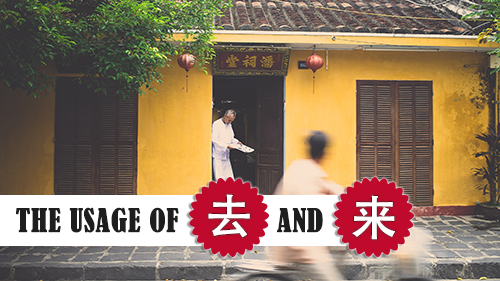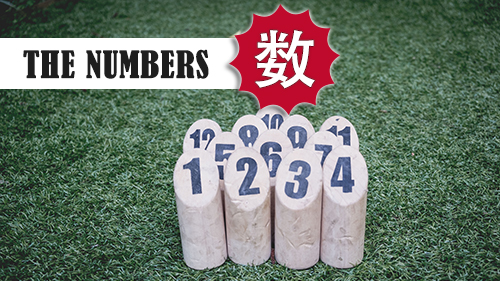Lessons
When I started studying Chinese at an evening course in 2011, it was love at first sight. Once the course ended, even if I was told that it would have been almost impossible, I continued to study it on my own buying several textbooks, watching tons of tv series in original language and keeping in touch with native guys through socials and letters, that gave a huge boost to my proficiency level of Chinese.
In this section I want to offer some lessons about linguistic and grammatical aspects of the Chinese language, hoping to arouse your curiosity and get you to become interested in this wonderful language.
-
The usage of 去 and 来

去 (qù) and 来 (lái) are directional verbs that respectively mean “to go” and “to come”, therefore suggesting distancing and approaching with respect to the person who is talking. 你什么时候会去北京? nǐ shénme shíhòu huì qù běijīng [you when FUT to-go Beijing] When will you go to Beijing? The person who is talking is not in Beijing. 我爸爸会来机场接我。 wǒ bàba huì lái jīchǎng jiē wǒ [I dad FUT to-come airport to-pick-up I]
-
Time words

Since Chinese language does not have tenses, time words are an aspect of this language that turns out to be necessary to understand when the action takes place. Time words are divided into four types: absolute time indicators: 十点 (shí diǎn) “at ten o’clock”, 星期天 (xīngqítiān) “on Sunday”, 三日六月 (sān rì liù yuè) “on June 3rd” relative time indicators: 明天 (míngtiān) “tomorrow”, 下个月 (xià gè yuè) “next month”, 去年 (qùnián) “last year” time names: 现在 (xiànzài) “now”, 最近 (zuìjìn) “recently”, 晚上 (wǎnshàng) “evening” location words: together with the characters 以 (yǐ) and 之 (zhī), which we have already discussed in the lesson Location words These expressions can serve as subject, object or determiner, often acting also as the topic of the sentence.
-
Location words

Location words are characters which are attached to a noun to indicate where it is located in relation to something else. They can be divided into short versions, which seldom occur on their own and long versions, which can be found both attached to nouns and on their own. Following, the main location words. SHORT VERSIONS 上 (shàng) – on, upon 你的裤子在床上。 nǐ de kùzi zài chuángshàng [you ST pants to-be bed upon]
-
Modal verbs: want

Chinese modal verbs that express willingness are: 要 (yào), 想 (xiǎng) and 愿意 (yuànyì). 要 (yào) is used to express the intention to do something. Given that, as explained in the lesson Modal verbs: have to, must, the negative form of 不要 (bù yào) is used to indicate prohibitions, when 要 has the meaning of “to intend to” or “to want”, its negative form is 不想 (bù xiǎng). Besides, it is used as a future indicator.
-
Modal verbs: have to, must

Chinese modal verbs that express necessity are: 要 (yào), 应该 (yīnggāi), 得 (děi), 需要 (xūyào) and 必须 (bìxū). 要 (yào) is used in the imperative form, whose negation is expressed with 不要 (bùyào) or 别 (bié). It also expresses an objective necessity. 你不要动!/你别动! nǐ bùyào dòng/nǐ bié dòng [you not to-have-to move] Don’t move! 你要好好地学习才能考上。 nǐ yào hǎohǎo dì xuéxí cáinéng kǎo shàng [you have-to good ST to-study then-and-only-then can pass-an-exam]
-
Modal verbs: can

Chinese language has at least three main verbs to express possibility: 能 (néng), 可以 (kěyǐ) and 会 (huì), each of which has slightly different nuances, although they may sometimes seem synonymous. 能 (néng) expresses the physical possibility to do something, it means to be able (intended as an innate ability), to have the permission or consensus to do something (generally used in questions and negative sentences) and indicates the existence of a possibility.
-
Separable verbs

Separable verbs represent a small part of the Chinese verbs that, even though they may look like bisyllabic verbs, they actually are composed by a monosyllabic verb and an object. For this reason, unlike real bisyllabic verbs, they can be separated. Let’s see some examples. 见面 (jiànmiàn) – to see each other, to meet – made up by 见 (jiàn) “to see” and 面 (miàn) “face” that acts as the object, literally “to see the face”
-
Locative verbs

Chinese locative verbs are verbs of motion, that indicate both movement and direction. They can be intransitive or transitive, as to say that they are followed by a locative object that has a direct relationship with the verb and, together with it, forms a verbal predicative group. Contrary to English, there are no prepositions between the verb and the object. Following, a list of the main locative verbs. 来 (lái) – to come, to arrive
-
The numbers

In this lesson we will learn the numbers, which will be also useful to learn the names of the months and the ones of the weekdays. Chinese numbers are very simple. Once we have learned the first eleven numbers, it will be very easy to remember all the others. Below is a list of the numbers from 0 to 11. 零 (líng) - zero 一 (yī) - one 二 (èr) - two
-
The topic-comment structure

In this particular structure of the Chinese language, the usual word order in a sentence (Subject-Verb-Object) is slightly reorganized. The object we are talking about is placed at the beginning of the sentence - in order to emphasize it - rather than after the verb, thus becoming the “topic”, The second part of the sentence is represented by the “comment”, that is to say by what is said about the “topic.